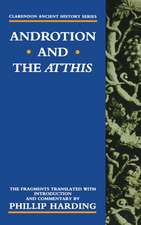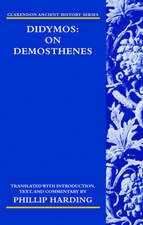From the End of the Peloponnesian War to the Battle of Ipsus: Translated Documents of Greece and Rome, cartea 2
Phillip Hardingen Limba Engleză Paperback – 20 feb 1985
Preț: 415.73 lei
Nou
Puncte Express: 624
Preț estimativ în valută:
79.56€ • 86.39$ • 66.83£
79.56€ • 86.39$ • 66.83£
Carte tipărită la comandă
Livrare economică 23 aprilie-07 mai
Preluare comenzi: 021 569.72.76
Specificații
ISBN-13: 9780521299497
ISBN-10: 0521299497
Pagini: 236
Dimensiuni: 150 x 226 x 13 mm
Greutate: 0.36 kg
Editura: Cambridge University Press
Colecția Cambridge University Press
Seria Translated Documents of Greece and Rome
Locul publicării:Cambridge, United Kingdom
ISBN-10: 0521299497
Pagini: 236
Dimensiuni: 150 x 226 x 13 mm
Greutate: 0.36 kg
Editura: Cambridge University Press
Colecția Cambridge University Press
Seria Translated Documents of Greece and Rome
Locul publicării:Cambridge, United Kingdom
Cuprins
Volume editor's introduction; Acknowledgements; Abbreviations; Symbols; 1. Ancient chronology; 2. Alliance between Athens and Eretria; 3. Rewards for the liberators of Athens from the Thirty; 4. Dedicatory epigram to Lysandros; 5. Athens honours loyal Samians; 6. The Athenians adopt the Ionian alphabet; 7. Athens honours the heroes of Phyle; 8. Thcozotides and the Athenian orphans; 9. The revised Athenian law-code (the calendar of sacrifices; 10. Extract from an inventory of the treasures of Athena and of the Other Gods; 11. Internal politics in Athens, Corinth, Thebes and Argos as the real cause of the Corinthian War; 12. The activities of Konon; 13. The battle of Sardis; 14. Alliance between Boeotia and Athens; 15. The Boeotian constitution; 16. Alliance between Athens and Locris; 17. Fortification of Peiraeus; 18. Spartan victory at Corinth; 19. Monuments for the Athenian casualties at Corinth and Coronea; 20. Athens honours Dionysios I of Syracuse; 21. Two treaties between Amyntas III and the Chalcidians; 22. Athenian mercenary forces at Corinth; 23. Athens rejects the Great King's peace; 24. Arbitration between Miletus and Myus; 25. Athens resumes alliance with Thasos; 26. Athens honours Clazomenae; 27. Leukon, king of the Bosporos; 28. Political change at Erythrae; 29. Athens honours Flebryzelmis; 30. Dissolution of Mantinea; 31. Alliance between Athens and Chios; 32. The occupation of the Cadmea; 33. Alliance between Athens and Thebes; 34. Alliance between Athens and Byzantium; 35. 'Charter of the Second Athenian Confederacy'; 36. A new name for tribute; 37. Methymna joins the Athenian Confederacy; 38. Alliance between Athens and Chalcis; 39. Reorganization of Athenian finances; 40. Athens honours Straton, king of Sidon; 41. Recommendation that Corcyra, Acarnania and Cephallenia enter the Athenian Confederacy; 42. Alliance of Athens and Corcyra; 43. Athenian alliance with Amyntas III; 44. The peace of 375/4; 45. Athenian law concerning the Certifier of silver coinage; 46. Epigram commemorating the Theban victory at Leuctra; 47. Extract from an Athenian naval record; 48. Boeotia honours a Carthaginian; 49. The Thessalians honour Pelopidas; 50. Institution of the Pezlietairoi; 51. The Arcadian League honours the Athenian Phylarchos; 52. Alliance between Athens and Dionysios I of Syracuse; 53. Athens honours Mytilene; 54. Seizure of the Attic Spondophoroi by a member state of the Actolian League; 55. Treaty between Athens and Ceos; 56. Alliance of Athens, Arcadia, Achaea, Elis and Phlius; 57. Greece and the Revolt of the Satraps; 58. Athens sends cleruchs to Potidaea; 59. Alliance between Athens and Thessaly; 60. Contributions for the rebuilding of the temple at Delphi; 61. Treaty between Philip II and Athens; 62. Philip II's relations with Thessaly; 63. Philip II captures Amphipolis; 64. Treaty between Athens and three Thracian kings; 65. Alliance of Athens and Euboean cities; 66. Athens aids Eretria; 67. Alliance between Philip II and the Chalcidians; 68. Arkesine honours the Athenian governor Androtion; 69. Andros garrisoned by the Athenians in the Social War; 70. Athenian alliance with Ketriporis, Lyppeios and Grabos; 71. End of the Social War; 72. Chares in Asia; 73. The siege of Methone; 74. Contributions to the Sacred War; 75. Euboulos and the Theoric Fund; 76. Treaty between Philip II and Kersebleptes; 77. Athenian cleruchs sent to Samos; 78. Resolution of the dispute over the Sacred Orgas between Athens and Megara; 79. Treaty between Erythrae and Hermias of Atarneus; 80. Alliance between Athens and Olynthus and Athenian aid to Olynthus; 81. Chalcidian refugees at Myrina in Lemnos; 82. Athens honours Spartokos, Pairisades and Apollonios; 83. Athens renews her alliance with Mytilene; 84. Extracts from the accounts of the Delphian Naopoioi; 85. Revision of the citizen-lists at Athens; 86. Athens rejects the















